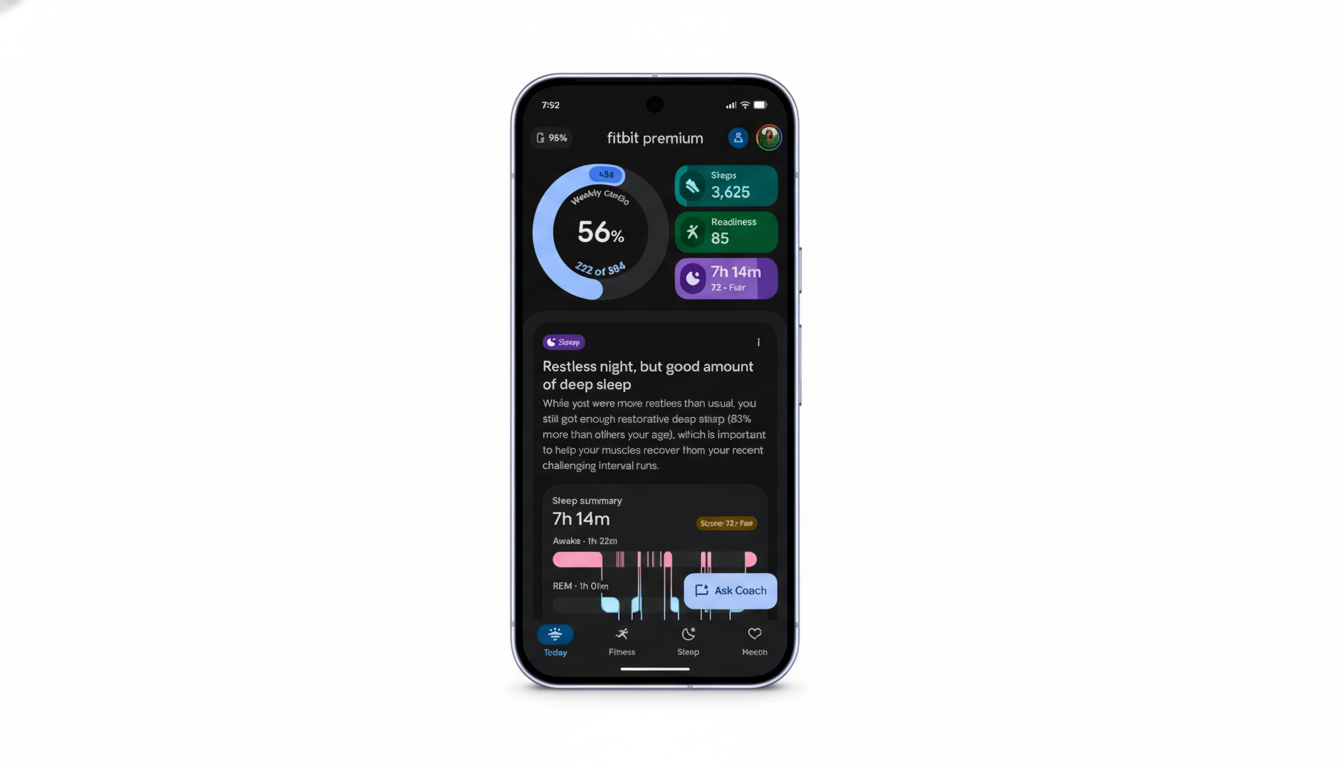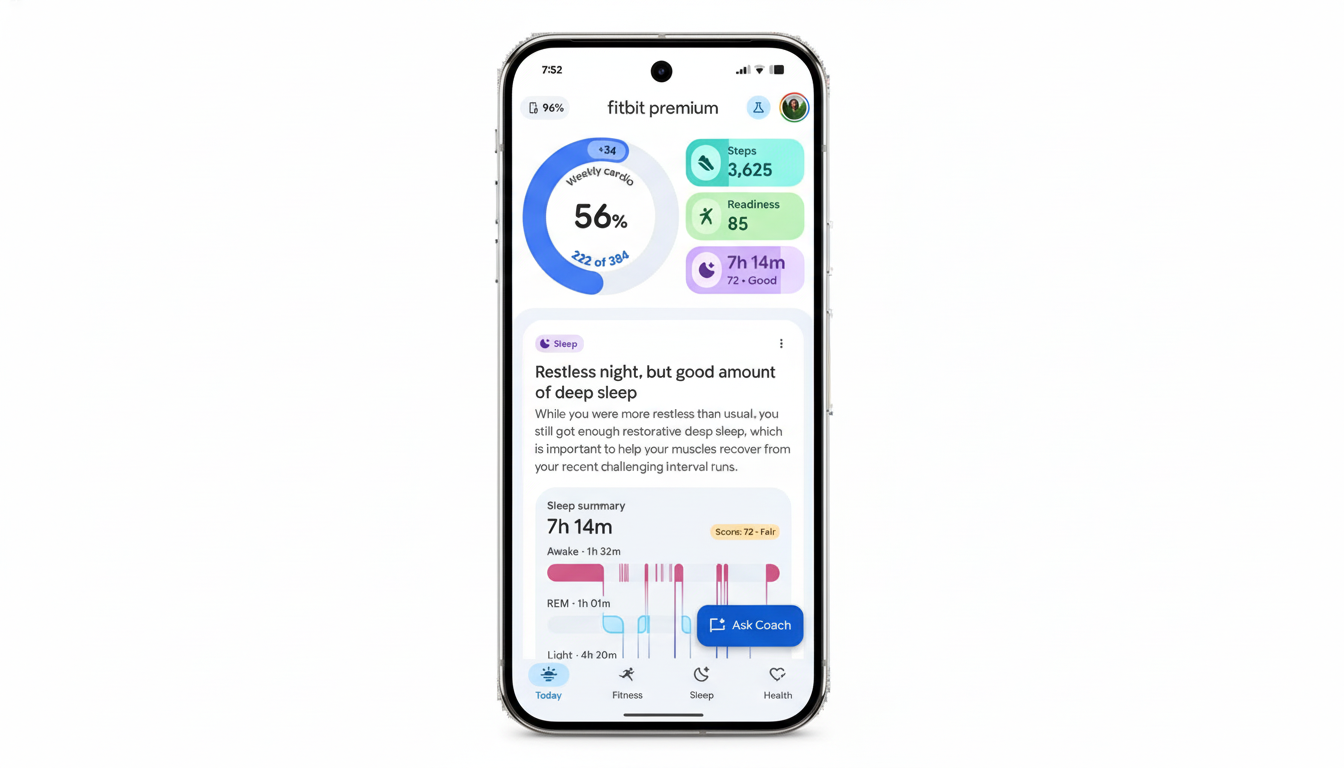Google is launching a Gemini-fueled Fitbit Personal Health Coach, providing some with an AI assistant that can talk about goals, make sense of trends and modify wellness plans using natural language. The public preview combines Fitbit’s activity- and sleep-tracking data with Google’s most recent large language model reasoning, in an attempt to turn raw metrics into appropriate, personalized guidance.
More than just a feature drop, this preview is an experiment in how conversational AI could make over the world of everyday health tracking. It comes with a cleaner Fitbit app, which is designed to focus on long-term progress over daily streaks and sees the coach as a layer that sits on top of your stats and turns them into actionable advice.

What the AI Coach Does in Google’s Fitbit Preview
Onboarding begins with a brief chat about your lifestyle, motivation and goals. With that context and your most recent Fitbit data, Gemini builds a plan that can bend with real life — from travel and full workweeks to recovery days and sleep disruptions. The point is to give you answers and adjust plans without sending you hunting around menus.
In this preview, coaching is built on three pillars: fitness training advice, sleep getting to know and everyday health nudges. You can pose follow-up questions, ask for changes and receive plain-language explanations of trends. Google is framing the experience for general wellness rather than diagnosis and says it will increase capabilities slowly as it gets feedback.
Who Can Try It Now and Where the Preview Runs
The offering is initially available to people with a Pixel Watch or certain Fitbit devices who have a Fitbit Premium subscription. It’s an Android-only trial in the U.S., with iOS support still planned. People can opt out of that view in favor of the classic Fitbit experience at any point, and Google aims for wider availability as it polishes features and prepares new Fitbit hardware.
Such a staged process reflects how big platforms normally launch AI-powered features:
- Deploy to a smaller, well-instrumented audience
- Gather ratings and free-form feedback
- Iterate toward broader release once reliability and guardrails meet internal thresholds
Inside the New Fitbit App and Its Coaching Features
The new-look Fitbit app rests on four tabs — Today, Fitness, Sleep and Health — which should help users zoom out of the daily grind to get a better handle on what sort of numbers they are posting through a week or maybe two. There is also now a Focus Metrics area that allows you to determine what signals are most important to you, whether that be zone minutes, resting heart rate, sleep score or readiness-style recovery indicators.
An Ask Coach button is found through the app, prompting on-the-go questions or plan adjustments from anywhere you can be. Thumbs-up and thumbs-down icons dot almost every page, and with their votes, users can grade the relevance of suggestions. It’s the feedback loop at the heart of the preview: The model’s suggestions have been tailored so that they should get better as users respond to whether something is helpful, or not.

Important: the preview doesn’t clone every feature of the app as is today. It’s a streamlined environment intended to confirm the coaching session — and users can roll back to the standard build whenever they want.
Privacy and Safety Considerations for Fitbit Coaching
Google stresses that the coach is aimed at broad wellness and designed with privacy and security in mind. That distinction counts: consumer wearable data often isn’t governed by health-privacy laws like HIPAA, and U.S. regulators have signaled they will enforce protections — say, through tools such as the Federal Trade Commission’s Health Breach Notification Rule — when apps misuse or leak sensitive information.
For people who use its services, the practical step is to scrutinize data controls, review auto-delete settings and recognize what’s shared across Google services.
Industry associations and public health organizations, among them the World Health Organization, also have called for AI in health to be transparent, accountable and evidence-based — a standard this preview will now be judged against.
Why This Matters for Wearables and Smartwatch Users
Wearable devices are evolving from passive trackers to interactive guides. Competitors are heading in the same direction: Whoop added a GPT-powered coach that can analyze context for training and recovery, while Apple and Samsung keep evolving personalized insights baked into their watch platforms. Smarter in-device guidance is a driver of the next upgrade cycle as hardware improvements become more marginal, industry analysts say.
By joining Gemini’s conversational reasoning to Fitbit’s mature data pipeline, Google is clearly betting that these coachlike interactions will make health features stickier (as the tech world likes to put it) and more useful. If the preview delivers on that, then it sets a standard for what a smartwatch or fitness band should be — not just count steps but help you make better decisions at any given moment.

